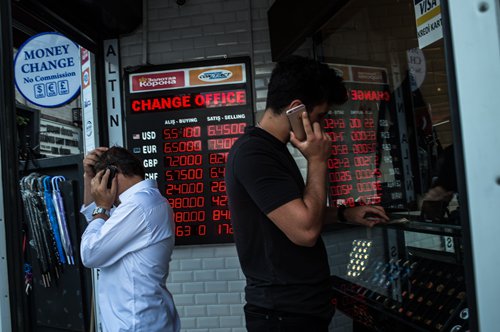Yuan protected by exchange controls: experts
The US government's trade protectionism measures and sanctions have caused serious falls for currencies in many emerging markets, like the Turkish lira, in recent days. The countries affected should boost their yuan holdings through measures such as currency swaps in order to replenish their shrinking foreign currency reserves, analysts said.

Turkish people check exchange rates at a currency exchange office on Saturday in Istanbul. (Photo: VCG)
On Friday, the Turkish lira plunged by 15.9 percent to a level of about 6.43 against the US dollar. The drop came after US President Donald Trump announced on his personal twitter account on Friday that the US would double tariffs on steel and aluminum imported from Turkey.
The Argentine peso also fell by 4 percent against the US dollar on Friday.
The yuan has been edging down in recent months against the rising US dollar.
The yuan's central parity rate against the dollar weakened by 78 basis points to stand at 6.8395 on Friday, according to data from the People's Bank of China (PBC), China's central bank.
On January 2, the first trading day this year, the yuan stood at 6.5079 against the US dollar, the PBC data showed.
Currency hard landing
Ding Jianping, a professor at the Shanghai University of Finance and Economics, told the Global Times on Sunday that rising US interest rates have strengthened the dollar, drawing international capital flows toward the US.
"With the interest rate hikes continuing, the dollar will continue to strengthen and there will be more international currency depreciation risks. This is an inevitable trend," Ding said.
Zhou Yu, director of the Research Center of International Finance at the Shanghai Academy of Social Sciences, said that for countries like Turkey, the protectionist tariffs and the strengthening US dollar will lead to a currency "hard landing" because of the economic vulnerability in those countries.
"International hot money tends to pick economically weak but loosely managed economies [like Turkey] for speculation activities," Zhou told the Global Times on Sunday.
Turkish President Recep Tayyip Erdogan announced on Wednesday that Turkey will diversify its sources of financing by issuing panda bonds in China, according to a report by the Asia Times on Thursday.
"This is an opportunity for the yuan to promote its internationalization, as more emerging markets will seek to decrease their reliance upon the US dollar and boost yuan-denominated holdings," Zhou said.
Yuan won't plunge
Experts also stressed that the yuan won't fall off a cliff like the Turkish lira, largely because the government's management of foreign capital flows has prevented the yuan from being heavily influenced by external factors.
"China's foreign currency mechanism has been designed so that it can adjust itself to avoid large-scale fluctuations and to prevent severe losses of foreign currency reserves," Zhou noted.
China's foreign currency reserves stood at $3.1179 trillion by the end of July, up $5.817 billion on a monthly basis, statistics from the State Administration of Foreign Exchange showed on August.
Cover image: A man changes money at a currency exchange office in Istanbul, Turkey August 13, 2018. (Photo: VCG)


